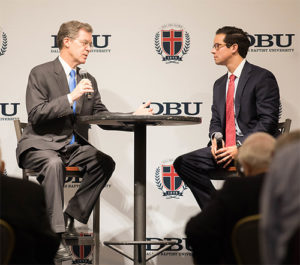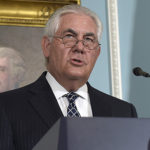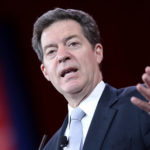DALLAS—Sam Brownback served in the U.S. House of Representatives and Senate and as governor of Kansas, but he told a Dallas Baptist University audience he considers advocating for international religious freedom his most important life’s work.
“I have had the opportunity to serve in many places for my country, and I’ve loved it. I’ve never been in any more important job than I’m in right now,” said Brownback, U.S. ambassador-at-large for international religious freedom.
Up to 80 percent of the world’s population lives in religiously restrictive environments, he reported.
“We protect the right of religious freedom for everybody—whoever you are, wherever you are, whatever you believe or don’t believe,” he said. “The government’s role in all of this is to protect the right of religious freedom. It’s not to pick winners or losers; it’s not to favor one over another.”
Pushing nations to honor religious freedom
While most nations have signed the Universal Declaration of Human Rights, which affirms religious freedom, the United States largely has stood alone in insisting upon its implementation and pushing other nations to honor it, he said.

“It is a fundamental right. If you can get this one right, a number of other rights will grow out of it,” said Brownback, who spoke at the invitation of DBU’s Institute for Global Engagement.
Beyond the principled argument that religious freedom is a “God-given right” no government has proper authority to restrict, the United States also appeals to other countries to honor religious freedom in their own enlightened self-interest, he added.
“More religious freedom means less terrorism and greater economic growth,” he said.
Furthermore, religious freedom releases “spiritual capital” into countries as people of faith work to improve healthcare and education and offer care for the most vulnerable members of society, he added.
Sign up for our weekly edition and get all our headlines in your inbox on Thursdays
Brownback pointed to the first Ministerial to Advance Religious Freedom—a U.S. State Department gathering that drew about 350 foreign ministers and religious freedom advocates from 84 nations to Washington in July—as a positive step.
A second global ministerial will be held in 2019, along nine regional religious forums on religious freedom, he announced.
“My hope is—and our work is—to get the gates of religious freedom open around the world,” he said.
‘Most troubling situation in the world’
Brownback pointed to the treatment of the Uighur Muslims in western China as “the most troubling situation in the world.”
Up to 1 million Uighurs have been detained in “re-education camps,” and the Chinese government has subjected the people in the region to genetic sampling to track them, he said.
Brownback expressed concern the Chinese are developing a system they can sell to other countries, making the pitch: “If you want to put down a particular group, if you want to be able to track them all the time, we’ve got the system. We’ve figured it out.”
“This is creepy. They are doing it to the Muslim-based population, and they take it into other areas as well,” he said.
Brownback, who spoke at DBU four days after American minister Andrew Brunson was freed after more than two years of detention in Turkey, praised President Trump for his role in securing Brunson’s release. When negotiations with the NATO ally nation proved ineffective, Trump sanctioned high-ranking Turkish officials and increased tariffs on Turkish steel and aluminum.
“It dropped their national currency to record lows and hit their economy hard,” Brownback said, noting an article in The Economist dubbed Brunson “the world’s most expensive prisoner.”
Brownback urged the DBU crowd to be part of a “grassroots movement” to advance religious freedom—focusing on a particular nation or people group.
“There is no greater cause out there,” he said.
World in perspective
Following his formal presentation, Brownback responded to questions from Nick Pitts, director of DBU’s Institute for Global Engagement, offering perspective on religious liberty in several countries:
- North Korea—The totalitarian state is among “the worst of the worst” in terms of denying religious freedom, Brownback said. Christians, in particular, are singled out for persecution, he added. For 16 years in a row, Open Doors has listed North Korea as the worst country globally in terms of persecution aimed at Christians.
- India—Brownback pointed to India as an example of a democracy where the government has allowed religious nationalists to use mob violence to oppress minority faiths.
- Russia and Ukraine—After the collapse of the Soviet Union, Russian government leaders embraced the Russian Orthodox Church. When Russia annexed Crimea and Russian-backed separatists seized control of eastern Ukraine, it led to a schism between the Ukrainian Orthodox Church and the Russian Orthodox Church. “The Russians want an outsized influence in the Orthodox world,” Brownback said.
- Iraq and Syria—Brownback led a U.S. delegation to northern Iraq June 30-July 3 to visit displaced and persecuted ethnic and religious communities—particularly Christians and Yezidis, groups that faced extinction. He pointed to initiatives to rebuild homes and churches across the Nineveh Plain as encouraging signs.














We seek to connect God’s story and God’s people around the world. To learn more about God’s story, click here.
Send comments and feedback to Eric Black, our editor. For comments to be published, please specify “letter to the editor.” Maximum length for publication is 300 words.